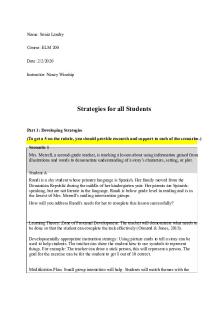HCA-360 Benchmark Ethics Breach PDF

| Title | HCA-360 Benchmark Ethics Breach |
|---|---|
| Author | Erin Broderick |
| Course | Health Information Technology and Management |
| Institution | Grand Canyon University |
| Pages | 4 |
| File Size | 80.2 KB |
| File Type | |
| Total Downloads | 54 |
| Total Views | 135 |
Summary
Assignment for HCA-360 Benchmark Ethics Breach. Great details...
Description
Benchmark – Ethics Breach Erin Broderick HCA-360 Abdul Mansour July 15, 2021
Although technology is becoming increasingly customary, it’s main purpose is to simplify the daily processes. It also is meant to make life more convenient. The extent at which people have become reliant on technology has only increased the need for advancements. With this much dependance, it increases the vulnerability of a cyber-attack. The purpose of the essay is to examine why technology has such a huge impact on healthcare ethics of wearable fitnesstracking devices and the selling of confidential data to insurance companies. Ethics Breach It was discovered in the scenario that technology companies that make fitness-tracking devices where selling consumer information to insurance companies. This is an example of an ethics breach. They have a lack of privacy and confidentiality of patient information. Confidentiality is an obligation they should uphold, and privacy is the right the patient has. Looking at it from an ethical standpoint, “keeping information private is not concerned with method of communication, but with information that is specifically confidential and be kept unless consent is given” (Olla & Tan, 2021, pg. 284). Both the insurance and tech companies are responsible for violating the consumer confidentiality. Consequences of an Ethical Breach Legal and ethical consequences occur with violations of patient privacy and confidentiality. Legal proceedings happen from all consumers who bought the devices within the specific timeframe. “From a legal perspective, the laws in the United States regarding privacy and confidentiality are varied. The broadest and perhaps most fundamental rights are found within the U.S. Constitution and the subsequent amendments” (Olla & Tan, 2021, pg. 285). Transparency with Customers
Moving forward from the violation, the insurance company will be responsible for implementing a process for obtaining written, electronic, or verbal consent. This will ensure that they are also communicating with customers on their end. This way the insurance company can inform the patient that their information is protected by HIPPA. Patients should be given a chance to sign a form that could allow them the opportunity to decline their information being released. Misuse of Customer Data One-way to misuse customer data is by allowing a third-party insurance company to use the health data from patients to suggest health and life insurance to future clients. Even if there is a medical emergency, if the information is shared between parties, they would still be in the wrong. According to Donnellan, “Research ethics is a set of regulations, rules, and protocols that are used to guide proper research and quality improvement activities” (Donnellan, 2018). The research ethics in the example were not followed by insurance company and there was a breach of ethics. Ethical Decision Making Technology advancements always have the opportunity to “enhance patient autonomy, increase patient safety, simplify management of diseases, increase connectivity, and assist in lifestyle changes to improve health (Philosophy, Ethics, and Humanities in Medicine, 2018). Both companies need to make a commitment to honor the confidentiality of consumer information to promote common good. The Christian Worldview protects the rights of patients and customers because it is based of ethical decision making.
References Chris Gilmartin, Edward H. Arbe-Barnes, Michael Diamond, Sasha Fretwell, Euan McGivern, Myrto Vlazaki, & Limeng Zhu. (2018). Varsity medical ethics debate 2018: constant health monitoring - the advance of technology into healthcare. Philosophy, Ethics, and Humanities in Medicine, 13(1), 1–7. https://doi org.lopes.idm.oclc.org/10.1186/s13010018-0065-0 Donnellan, J. (2018). Achieve Organizational Integrity. Healthcare Executive, 33(2), 52–54. Olla, P. & Tan, J. (2021). Adaptive health management information systems: Concepts, cases, and practical applications (4th ed.). Retrieved from https://www.gcumedia.com/digitalresources/jones-and-bartlett/2019/adaptive-health-management-informationsystems_concepts-cases-and-practical-applications_4e.php...
Similar Free PDFs

HCA-360 Benchmark Ethics Breach
- 4 Pages

Breach
- 15 Pages

Benchmark - SIOP
- 7 Pages

340 Benchmark
- 10 Pages

Benchmark Com 222
- 6 Pages

Benchmark Gospel Essential
- 7 Pages

Benchmark - Gospel Essentials
- 10 Pages

Benchmark Personality Essay
- 11 Pages

10 cosas del Benchmark
- 2 Pages

benchmark- non christian symbols
- 4 Pages

Benchmark Implicit Prejudice
- 6 Pages

Benchmark Implicit Prejudice
- 5 Pages

Benchmark Paper - Grade: A
- 8 Pages

Benchmark Character Analysis
- 3 Pages

Tesla Benchmark 1
- 4 Pages
Popular Institutions
- Tinajero National High School - Annex
- Politeknik Caltex Riau
- Yokohama City University
- SGT University
- University of Al-Qadisiyah
- Divine Word College of Vigan
- Techniek College Rotterdam
- Universidade de Santiago
- Universiti Teknologi MARA Cawangan Johor Kampus Pasir Gudang
- Poltekkes Kemenkes Yogyakarta
- Baguio City National High School
- Colegio san marcos
- preparatoria uno
- Centro de Bachillerato Tecnológico Industrial y de Servicios No. 107
- Dalian Maritime University
- Quang Trung Secondary School
- Colegio Tecnológico en Informática
- Corporación Regional de Educación Superior
- Grupo CEDVA
- Dar Al Uloom University
- Centro de Estudios Preuniversitarios de la Universidad Nacional de Ingeniería
- 上智大学
- Aakash International School, Nuna Majara
- San Felipe Neri Catholic School
- Kang Chiao International School - New Taipei City
- Misamis Occidental National High School
- Institución Educativa Escuela Normal Juan Ladrilleros
- Kolehiyo ng Pantukan
- Batanes State College
- Instituto Continental
- Sekolah Menengah Kejuruan Kesehatan Kaltara (Tarakan)
- Colegio de La Inmaculada Concepcion - Cebu
